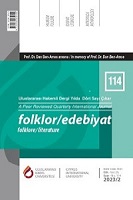Disiplinler ve Post-Disipliner Tarihçeler: Kuram, Çeviri ve Kültürlerötesilik
Disciplines and Post-Disciplinary Histories: Theory, Translation, and Transculturality
Author(s): Hande Birkalan-GedikSubject(s): Customs / Folklore, Ethnohistory, Social history, Cultural Anthropology / Ethnology, Culture and social structure
Published by: Uluslararası Kıbrıs Üniversitesi
Keywords: traveling theory; post-disciplinary histories; history of folklore; folklore and folklorists in the USA; folklore and folklorists in Turkey;
Summary/Abstract: This article addresses the role of “traveling theory” in the making of disciplinary histories by departing from and critically reflecting on the concept. In simple terms, Said defines “traveling theory” as “a theory divorced from its original real-life moment of articulation and applied to a later time and place” (1983, 226). Although Said revisited his earlier formulations and emphasized the crucial role context plays in “traveling theory,” both in its origins and in its adaptations and modifications at different destinations (Said 1994), certain aspects of his arguments remained open. Among other issues, Said was criticized for not adequately considering the central role of translation in facilitating or thwarting the theory’s travels. I take this important concern as one of the anchor points of this article and highlight some of the evaded issues about translated texts in traveling theories and their impact on transculturation. Rather than sticking to the singularity of the original term “traveling theory,” I employ the term in the plural strategically and emphasize that theories can take multiple routes. As such, I evoke the images of assemblage (or agencement, in French)—a concept that frames social complexity through fluidity, exchangeability, and connectivity; and rhizome—a concept in post-structuralist theory, that refers to non-linear roots and networks. Taken together these images as theoretical models can prove useful for disciplinary historians, as ideas and concepts, taken up by different disciplines, can be mutated, and eventually become something completely different. First, by tackling issues of translation and considering delays, omissions, rejections, and appropriations of theories, I underline that texts enter dynamic translation processes. Travel itself generates contact (and often, conflict) zones between different actors, geographies, and histories—a mediated transference between “source” and “host” languages and subversions of such delineations. Thus, the process of translation becomes a creative act in itself, one that produces new meanings and insights. It challenges us to rethink the relationship between language and knowledge, and to consider how knowledge is created and transformed through translation. Second, I consider the role of theory in disciplining fields, in particular, in “disciplining folkloristics.” I analyze certain key texts, theories, and theorists in folklore. In the face of recent discussions on “critical folkloristics,” (Otero ve M. Rivera 2021), I suggest that writing disciplinary histories against the backdrop of recent global developments, such as Black Lives Matter, COVID-19 protests, and other post-colonial reading human reactions to social realities, is both possible and necessary. I also underline that mistakenly construed boundaries between academic and public folklore need to be rethought and reworked. Instead, I propose an integrated, activism-oriented, post-disciplinary traveling theories, from which folklore studies will greatly benefit. Last, I take transculturation as an effective tool to understand theory’s role in postdisciplinary histories. Transculturation is a term owed to Cuban anthropologist Fernando Ortiz (1940), who questioned the common view that cultural encounters work only in one way. Instead, he suggests that they are reciprocal processes in which some cultural characteristics may be lost, while new elements emerge. Thus, Ortiz referred to this process as “transculturation.” This concept has been widely applied to the study of colonial encounters and has proved very productive in de-colonizing effects and has been applied critically in different contexts (Pratt 1992; Welz 2009), such as the related term “creolization” (Hannerz 1989). According Roger Abrahams, who defined creolization through a reflexive look from the margins, is the linguistic and social process by which different peoples came together under the harsh regime of export-oriented plantation agriculture” (Abrahams, 2005: 222). Disciplinary knowledge blossoms through the movement of words, ideas, concepts, theories, and theorists. This holds true for folklore. Folklorists, especially when working as translators of culture in the field, textualizing knowledge in their publications, and presenting their work at conferences, make ideas, theories, and concepts travel. And yet, while in recent years, folklorists have debated the relationship of theory to disciplinary formation and presented various viewpoints, the idea of “traveling theory,” a point that might be seen as obvious, has not been addressed at large. Previously, discussions centered around folklore’s theoretical stance and introduced perspectives ranging from “anti-theory” (Haring 2016, 2008) to “humble theory” (Noyes, 2016, 2008). Here, I am referring to the notable collection, the special issue of the Journal of Folklore Research (2008), whereby several scholars investigated the reasons why there is no general theoretical model in American folklore studies, while other disciplines, such as literature and anthropology, possess excellent theories. Going beyond what kind of theory folklore studies have, I explore the travels of theories across unexplored planes in a terra incognita—in an unmapped geography in folklore and beyond. Given the transnational nature of folklore studies today, it is imperative to recognize that a lively, yet under-debated theoretical plane exists. With a critical stance, I demonstrate the relevance of translation, traveling theorists, and traveling concepts to “traveling theory” in trans-cultural and trans-historical circumstances across languages and disciplinary traditions. The engagement with Edward Said is also a fitting way to mark the fortieth anniversary of his “Traveling Theory” (1983). This approach allows us to understand how different perspectives, ideas, and theories can travel across cultural and linguistic boundaries and how they can be adapted to various contexts. Finally, I emphasize the need to engage with multiple sources in order to gain a deeper understanding of any given idea or concept.
Journal: Folklor/Edebiyat
- Issue Year: 29/2023
- Issue No: 114
- Page Range: 387-406
- Page Count: 20
- Language: Turkish

